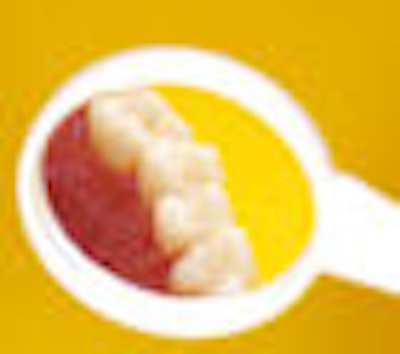
NEW YORK (Reuters Health) - U.S. researchers who followed healthy male veterans for up to 24 years found that older men who ate more high-fiber fruits were less likely to show signs of gum disease.
For more than 600 men participating in a long-running Veterans Affairs (VA) dental study, each serving of high-fiber food was linked to an almost 30% lower likelihood of lost teeth and a 24% lower risk of bone loss associated with receding gums.
The apparent benefit wasn't seen in men younger than 65, and when the researchers looked more closely at the types of foods that made a difference, high-fiber fruits like bananas, apples, or prunes were the only ones that seemed to offer protection, they report in the Journal of the American Geriatrics Society.
Approximately 10% of U.S. adults suffer from moderate to severe gum disease, which can include bleeding gums, receding gums, tartar buildup, and tooth loss.
The problem becomes more common with age, and is thought to affect roughly 20% of Americans over 75.
Although previous research has demonstrated that dietary fiber can help lower cholesterol, control blood sugar and aid weight loss, less is known about how eating high-fiber foods may impact dental health.
The new study, led by Elizabeth Krall Kaye, an epidemiologist at the Boston University School of Dental Medicine, followed 625 healthy men from the Boston area for an average of 15 years.
Researchers first assessed participants' dental health in 1984 and every three to five years after that.
Before each examination, men filled out a questionnaire about their daily intake of certain high-fiber foods -- those that contained more than 2.5 grams of dietary fiber per serving.
That list includes bananas, apples, oranges, blueberries, broccoli, Brussels sprouts, sweet potatoes, spinach, peanuts, oatmeal, and other grains.
In men age 65 and older, the researchers found that each additional serving of high-fiber fruit was associated with a 14% lower risk of erosion of the part of the jaw bone that supports the teeth, a five% lower risk of gum recession, and a 12% lower likelihood of tooth loss.
Eating high-fiber vegetables and grains did not significantly reduce the men's risk of gum disease.
The study doesn't prove that the high-fiber fruits lowered the men's gum-disease risk. A fruit-filled diet could be a sign of some other factor -- such as high vitamin intake, an overall healthy lifestyle, more frequent flossing, or even less smoking -- any of which could be at work.
Kaye's team is not yet clear about why high-fiber foods, especially fruits, would lead to less gum disease if they are playing a role. One possibility is that foods high in fiber, which often require more chewing, could increase saliva production, which would remove harmful bacteria from the mouth.
Dietary fiber might also help reduce gum disease by controlling blood sugar and lowering blood pressure -- poorly controlled blood sugar and high blood pressure are both risk factors for gum disease.
Eating high-fiber foods should not be a substitute for seeing the dentist, according to Dr. Marjorie Jeffcoat, a gum disease specialist at the University of Pennsylvania School of Dental Medicine in Philadelphia.
Good oral health is key to preventing gum disease, said Jeffcoat, who was not involved in the VA study.
Kaye agrees that her results are too preliminary to recommend relying on apples and oranges in place of good dental care.
Furthermore, over 95% of the study participants were white, non-Hispanic men, she notes. Though the mechanism at work is most likely the same in women and minorities, "we should be cautious in generalizing these results to other segments of the population until there is further research," Kaye told Reuters Health.
By Lindsey Konkel
Source: bit.ly/xxB6Qu
Journal of the American Geriatrics Society, online February 8, 2012.
Last Updated: 2012-02-24 14:15 (Reuters Health)
Copyright © 2012 Reuters Limited. All rights reserved. Republication or redistribution of Reuters content, including by framing or similar means, is expressly prohibited without the prior written consent of Reuters. Reuters shall not be liable for any errors or delays in the content, or for any actions taken in reliance thereon. Reuters and the Reuters sphere logo are registered trademarks and trademarks of the Reuters group of companies around the world.



















